Hi, we’re John and Matt and, icymi, we are watching every single live-action film starring Streep...
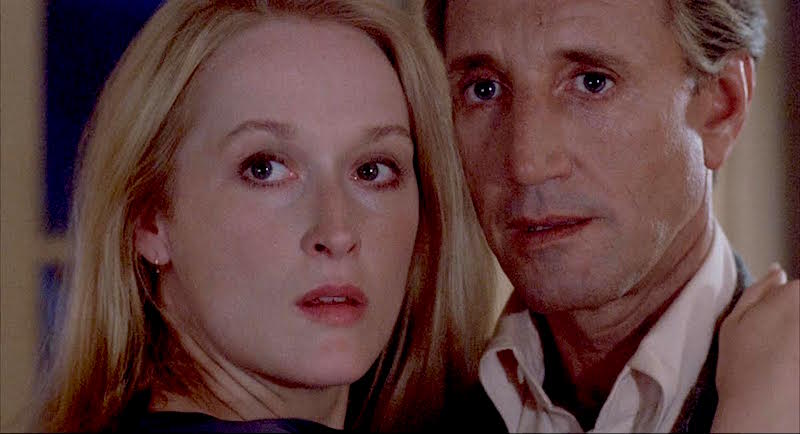
#7 — Brooke Reynolds, a Waspy urbanite and unlikely femme fatale with a shady past and a killer blonde bob.
MATTHEW: No actor, not even the oft-cited Greatest Actress of All Time, is immune to the inevitable and indisputable stinker. Seven projects in and just touching the surface of true-blue movie stardom, Meryl Streep finally made her first real turkey...
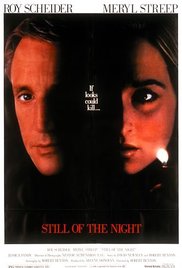 Still of the Night, Robert Benton’s subdued, sub-Hitchcockian Manhattan noir, almost certainly places within the lowest ranks of Streep’s filmography, which, at this early juncture in the actress’ career, wasn’t entirely made up of masterpieces. I think Julia and The French Lieutenant’s Woman remain hazy, fragmentary cinematic experiences, but place them against Still of the Night, and these titles suddenly look like precise and accomplished filmic achievements.
Still of the Night, Robert Benton’s subdued, sub-Hitchcockian Manhattan noir, almost certainly places within the lowest ranks of Streep’s filmography, which, at this early juncture in the actress’ career, wasn’t entirely made up of masterpieces. I think Julia and The French Lieutenant’s Woman remain hazy, fragmentary cinematic experiences, but place them against Still of the Night, and these titles suddenly look like precise and accomplished filmic achievements.
What’s odd about Still of the Night, though, is that it began as an altogether high-pedigree production. Benton had just won writing and directing Oscars for Kramer vs. Kramer, whose acclaimed cinematographer Néstor Almendros also returned for this genre-switching venture. Add in composer John Kander and costumer Albert Wolsky and it makes sense why Streep would take on a role in which she appears instantly and irreparably miscast, despite Benton’s insistence that he wrote the character with Streep in mind after working with her on Kramer, in which Streep literally rewrote the unhappy Joanna Kramer into a thinking, full-bodied woman and nicely balanced out her film in the process.
The thriller plays out like a Brian De Palma potboiler without the unimpeachable craft or lurid enthusiasm. It's already gone off the rails before Streep enters the picture! But unlike so many of her lesser projects, Streep’s entrance doesn’t salvage the film or even the character. In fact, it’s clear from her very first scene that Streep is pretty much going to sink with the entire ship. It doesn’t help in the slightest that she’s stuck playing a woman named Brooke (!) Reynolds, a name better suited for a scowling, shoulder-padded, goblet-of-wine-throwing soap opera starlet than any character played by Meryl Streep.
In any case, Streep’s Brooke is an auction house worker whose older lover and co-worker topples out of the driver’s seat of a car, having been stabbed to death and found by a carjacker during the film’s risible opening sequence. By the time a whispery, jittery Brooke creeps into the office of Dr. Sam Rice, a recently-divorced psychologist who treated the deceased and is played by a stolid and equally ill-suited Roy Scheider, we can clearly discern the entire arc of this oh-so familiar archetype. She’s the type of woman whose beauty leads men to make reckless, self-sabotaging decisions. Streep, with her creamy complexion and lustrous, above-the-shoulder haircut, definitely looks the part. But it only takes a moment to gauge from her uncomfortable, deer-in-headlights expression and wavering Continental accent, which is clipped in a way not entirely unlike Madonna’s feignedly posh Britspeak, that Streep will only be playing at mystery as opposed to believably projecting it.
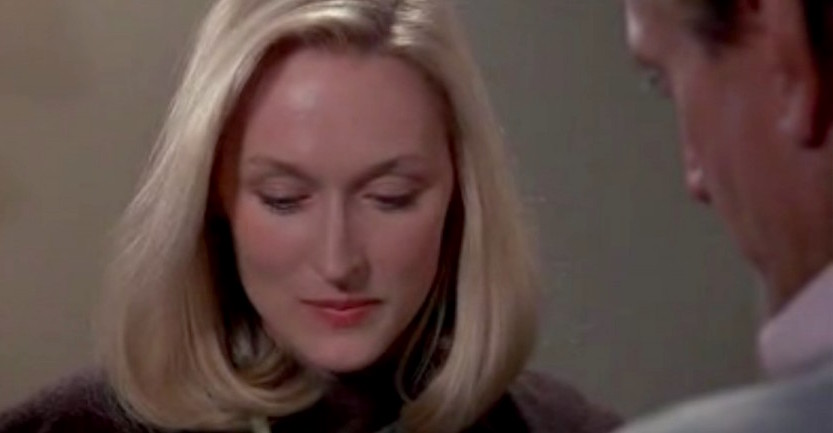
John, why don’t you take us through the even rougher passages of this truly unfortunate Streep performance, which even she admits was a botch:
“I didn’t know what I was doing in that. Again, I had no idea who my character was. I hate noir. It’s not about playing a person, but a representation, usually of the girl. Kim Basinger in L.A. Confidential was the closest recently – that was a person. The ones that are just seen through mystery and smoke – I’m not interested in them.”
– Meryl Streep in Entertainment Weekly, March 2000
JOHN: Are there any non-rough passages of Still of the Night? I can’t remember any in this bland, faux-Hitchcockian pastiche, in which Meryl Streep makes less of an impression than a prop corpse. In that Entertainment Weekly snippet, Streep is right to point out how noir films often ask women to play ideas, a representation rather than a person. Specifically, in the star-spangled repertoire of Hitchcock’s catalog, the director often recycles such stock figures as the Wrong Man, the Blonde, the Good Voyeur, the Bumbling Authority Figure, the Ordinary Man in An Extraordinary Circumstance, the Duplicitous Spy, and so on, but through Hitchcock’s direction and the immense talent he employed to fill these roles, each character feels alive and distinct. In Benton’s tepid homage, Scheider is a shallow composite of Jimmy Stewart in Rear Window (and sometimes, laughably, in Vertigo), Robert Donat in The 39 Steps, and Cary Grant in Notorious; he can’t decide whether he’s onto or into Brooke, and his lust propels him into exciting but dangerous territory.
Brooke Reynolds is a Hitchcock Blonde in name only. The Hitchcock Blonde, a woman who always possesses more knowledge than the men around her – and suffers for this – usually has a threatening perfection that sends men spiraling. Hitchcock Blondes are mysterious and sophisticated, but their films often prod, test, or terrorize them into revealing some inner anguish (Marnie, Notorious, Vertigo) and or punish them for their intuition and/or their elegance (Blackmail, Rebecca, North by Northwest, The Birds). In Still of the Night, Streep is neither the icy Hitchcock Blonde nor the fumbling Wrong Man, but rather a broad mixture of the two. Streep, who excels at signaling ambiguity and mystery even when she’s not required to, just doesn’t invest any mystery into the role. She doesn’t convince as either a destabilizing femme fatale or a wrongly accused damsel. The film posits Brooke as a prime suspect throughout a string of suspicious situations: a possibly erotic late-night visit from a gentleman caller, a Central Park stabbing, the discovery of a torn newspaper article stuffed into her desk. These scenarios are meant to keep the audience guessing, perhaps hinting at some menace within, but Streep’s performance doesn’t signal any of that. Instead, Streep looks as confused as we are about what role she’s meant to be playing. She’s a stiff cipher and her alabaster beauty is not stirred to any eruptions of psychotic release. It’s shocking to see Streep be this boring and play this ridiculous film so dully straight, never suggesting that she might actually be a vicious killer and rendering her innocently naïve suspect as an entirely blank slate.
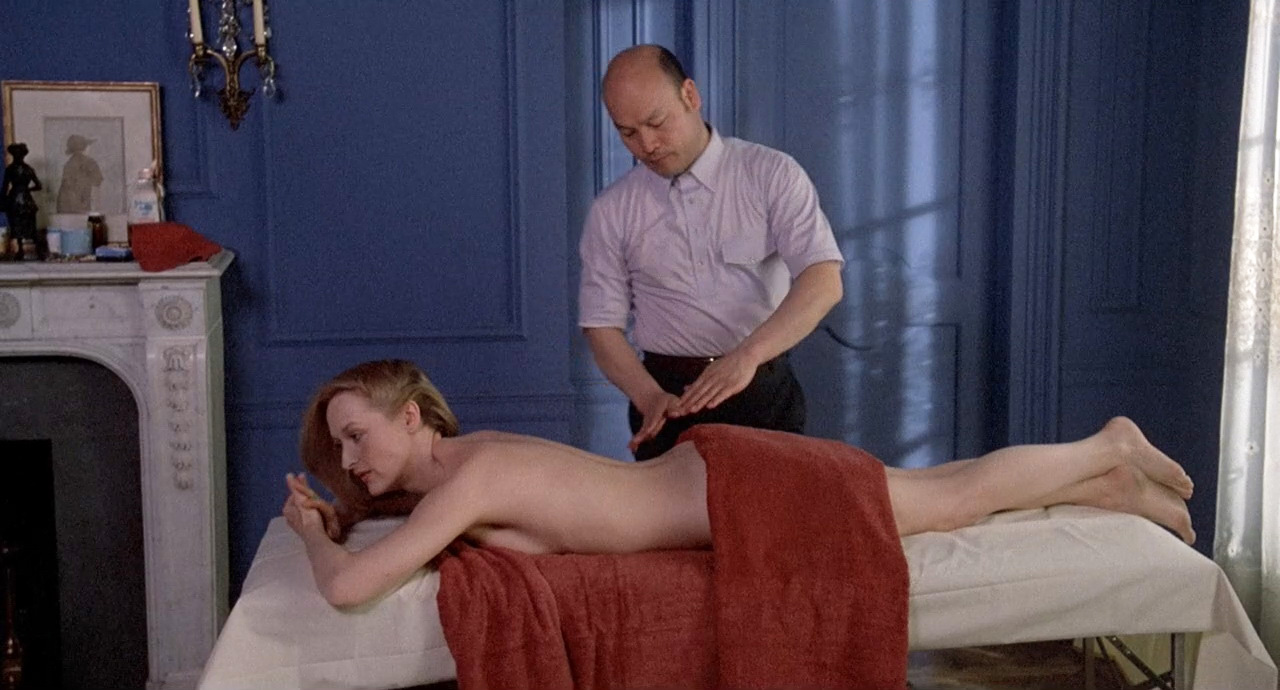
Robert Benton is no De Palma and is certainly no Hitchcock. Take, for instance, his completely misjudged decision to have Brooke’s mysterious suitor, glimpsed by her late lover, turn out to be a masseur. “I have terrible back pain,” she demures when Sam catches her, mid-massage. The masseur then quietly works Brooke’s shoulders as she and Sam try to have a revealing conversation about their budding romance. She’s nude, belly-down, and preoccupied as he, standing awkwardly across the room, admits his infatuation. It’s an unexpectedly hilarious scene for all the wrong reasons. Benton just can’t create an atmosphere for these confessions to have any weight, even going so far as to make the words themselves inconsequential amid the absurdity of the situation. Can you blame Streep for so drastic a misfire if this is the caliber of filmmaking that she’s up against?
Is there anything worth remembering about this movie?
MATTHEW: There are a few things but that’s only because they are deliciously and unequivocally awful. First there's a howler of a dream sequence involving an eerily silent gamine and a one-eyed teddy bear whose empty socket oozes blood. Then there's that aforementioned nighttime montage in Central Park that involves what can only be described as the world’s most patient mugger. The idea of sex with an Asian man is used as a lurid behavioral peculiarity. And there’s a snooty secretary who may or may not be keeping a secret. How do we know this? Because she has brown hair and one of the most pitiful perms in 1980s American cinema.
Still of the Night might have taken its rightful place as an instantly disposable early-decade dud were it not for Streep’s involvement. Still of the Night, like many noir thrillers, only needs an outline of a woman. But it has no idea what to do with a performer intrinsically inclined towards flesh-and-blood inhabitation of her characters. And Streep is indeed woefully unmysterious as a shifty-eyed, chain-smoking seductress who takes deep, purposeful pauses between every other words and slinks into rooms hissing things like, “What did you tell the police about me?” without any formal greetings. Streep can play enigmatic or sultry, as The Deer Hunter and The Seduction of Joe Tynan exhibited, but only when there’s an actual character emitting these auras. And when it comes to finally making sense of this jumbled character, she gets no visible help from Benton, Scheider, or frankly anyone save for her ever-loyal hair and makeup partner J. Roy Helland, who began his ongoing big screen collaboration with Streep on this misbegotten movie. He at least has the smarts to distract us from the actress’ pallid presence here with those flawlessly-styled blonde locks.
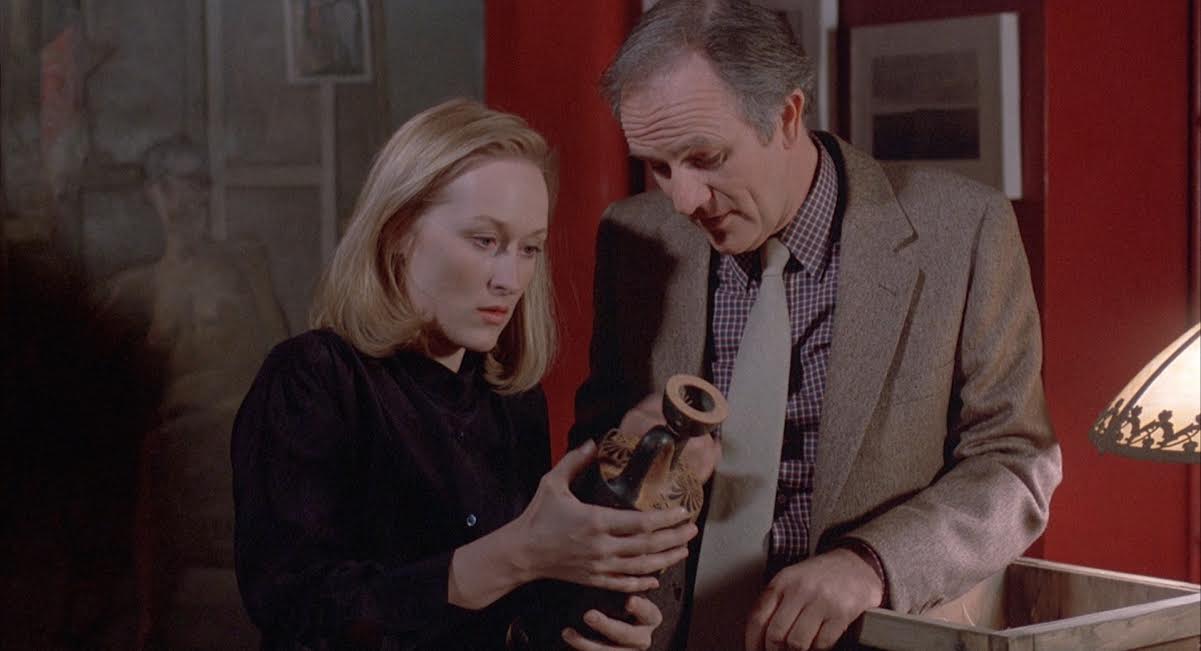
Somewhat tragically, Still of the Night may be most memorable for containing the first and so far only instance in which I’ve ever seen Meryl Streep truly, utterly, and undeniably flail on film. In a climactic monologue, Streep’s Brooke reveals the calamitous truth of her upbringing in an emotional, expository speech that has no place whatsoever in noir. It’s as if Benton suddenly and inexplicably decided that this movie should not just startle but move audiences as well, which is why we get Streep reciting her character’s entire backstory in a bafflingly extended close-up that Benton’s editors straight-up refuse to edit. Hence, Streep stammers, fidgets, squints, sighs, and unravels right in front of our eyes yet it’s not the character we’re watching fall apart but the actress herself. I take no joy whatsoever in watching Streep disintegrate on screen but thankfully Still of the Night has endured, if such a word can even be used to describe this flop, only as a curious blip within Streep’s long and legendary career. And, besides, there was one masterwork of a performance hitting movie theaters just three weeks later in 1982 to take everyone’s minds off of the hopeless Brooke Reynolds...
Previously: Julia, The Deer Hunter, Manhattan, The Seduction of Joe Tynan, Kramer vs. Kramer, The French Lieutenant's Woman